The corruption scandal known as Lava Jato – or Car Wash, its police code name – began as a small-time money-laundering investigation in a southern Brazilian town three years ago, but has swelled to the point that it threatens the entire Brazilian political class. All five living former presidents and almost a third of cabinet ministers and the Senate have either been indicted or are under investigation in a mammoth scam that involved bribes for public works contracts and pro-business changes to legislation.
But the effects of this scandal are being felt far beyond Brazil. Prominent politicians in a half-dozen countries across Latin America are now under investigation for bribery allegations stemming from Lava Jato, including the current and two former presidents of Peru and Colombian President Juan Manuel Santos, who won the Nobel Peace Prize last year.
Huge infrastructure projects – highways, bridges, sanitation facilities and power plants – are frozen or have been scrapped as prosecutors probe bloated contracts and a web of kickbacks. The public-works contracts were held by Brazilian construction giants such as Odebrecht SA or OAS, which are at the heart of the Lava Jato investigations. Brazil's National Bank for Economic and Social Development was a key funder of many of the projects. Loans for 25 projects in nine countries totalling $7-billion (U.S.) are now frozen.
Seventy-seven Odebrecht executives, including chief executive officer Marcelo Odebrecht, who is serving a 19-year sentence, have provided detailed information to prosecutors on the company's long history of bribery. Last December, as part of an agreement with the U.S. Justice Department and Swiss and Brazilian prosecutors, Odebrecht agreed to pay a world record $3.5-billion fine after admitting it paid $788-million in bribes to win contracts in 12 countries.
Brazil's economy has been crippled by Lava Jato. Colombia and Peru, which have the region's two strongest economies, are also being hit hard. Peru's Economy Minister says the Lava Jato-related project freezes will trim between 0.5 and one percentage point off his country's economic growth this year.
Peru has banned Odebrecht from bidding on new contracts in the country and Colombia is considering a similar move. In all the affected countries, contracts held by Odebrecht or the other Brazilian firms are being reopened for new tenders – a process that has set the building of badly needed ports and subway systems back by years.
The shortage of critical transportation infrastructure – ports, highways, airports – and energy infrastructure such as hydroelectric plants and gas pipelines is a key bottleneck for growth across the region.
In addition to fines in the United States, Odebrecht is paying $189-million in penalties in the Dominican Republic and $59-million in Panama. Investigators say there are still years of work ahead to unravel the kickback network involving the other firms and warn that more projects could be affected.

Mexico
Prosecutors in Brazil say a number of contracts with Mexican state oil company Pemex were awarded through bribes from Odebrecht and that documents tie former president Felipe Calderon to the scam.

Cuba
During the 13 years of Workers’ Party rule in Brazil, the government cultivated close ties with Cuba, and Odebrecht and other firms got Brazilian government-backed loans to build Cuba’s massive new port zone and other infrastructure.
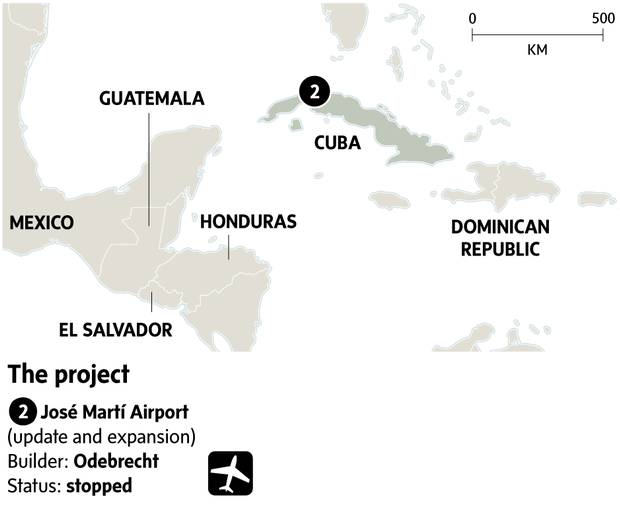
Dominican Republic
Odebrecht says it paid $92-million to win contracts in the Dominican Republic. President Danilo Medina and two of his predecessors are all under investigation for bribery related to Lava Jato, and Minister of Industry and Trade Juan Temistocles Montas was arrested on May 29. Dozens of other senior political figures have been named as suspects in the graft scheme. The vast array of projects and huge size of the bribes threaten the stability of the government.
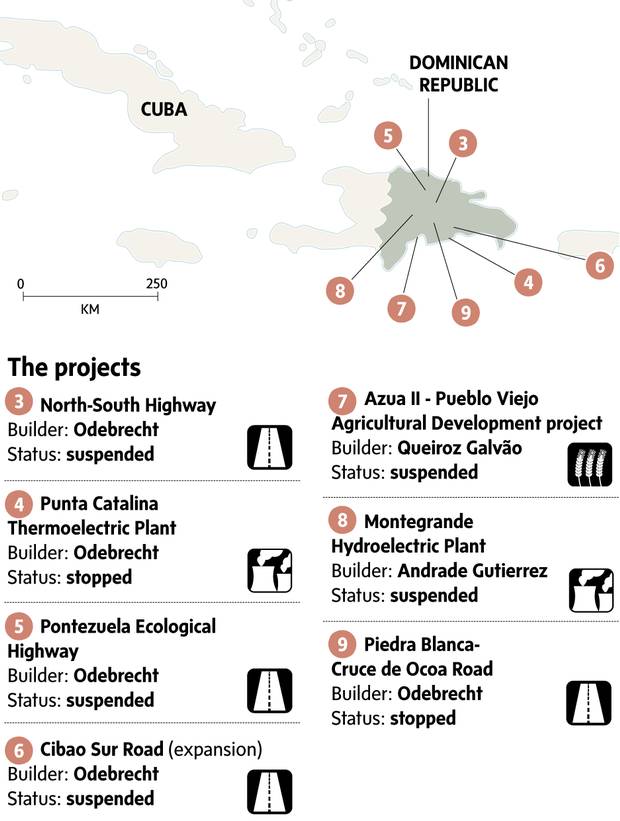
Guatemala
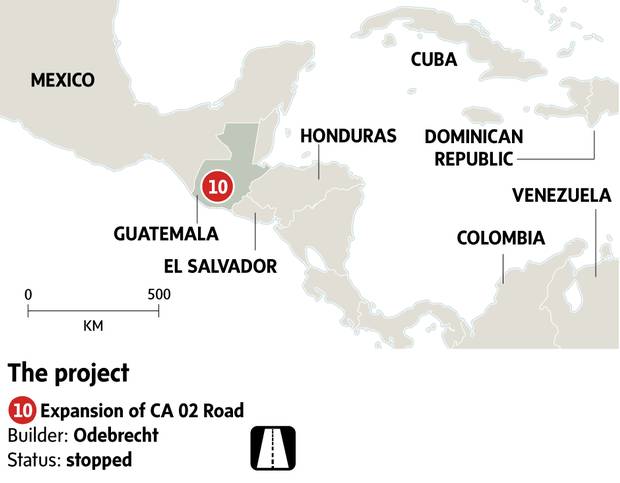
Honduras

El Salvador

Venezuela
Prosecutors in Brazil say documents show President Nicolas Maduro accepted bribes from Odebrecht on behalf of his predecessor, Hugo Chavez. The company says it paid $98-million to win contracts in Venezuela.
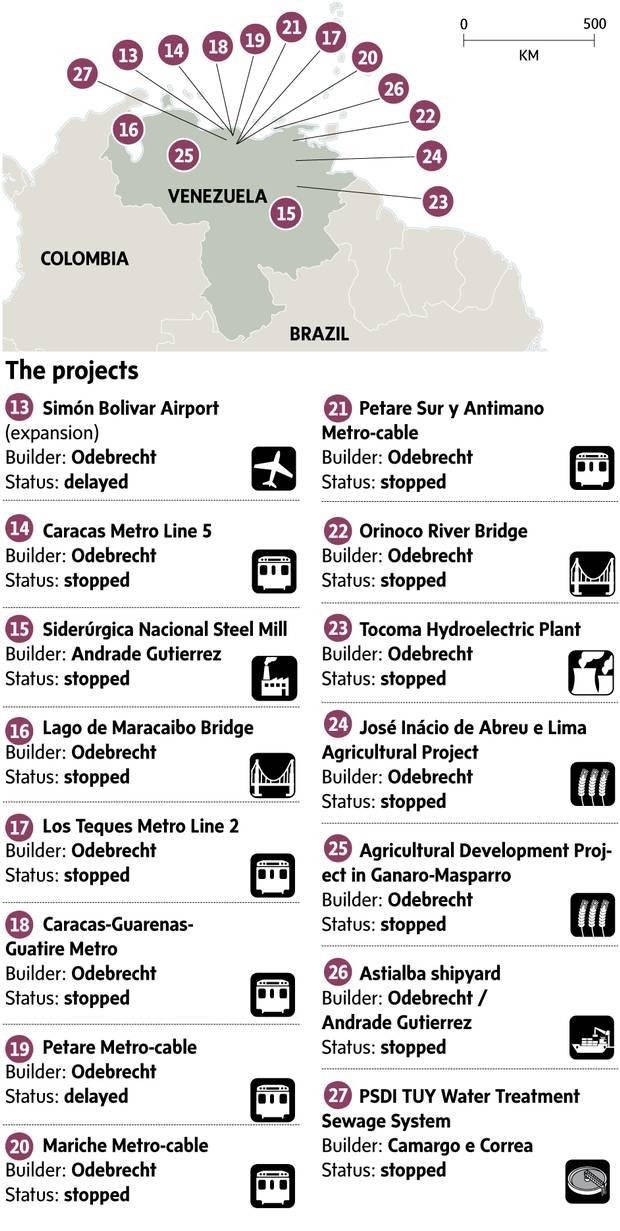
Colombia
A former deputy transport minister and a former senator have been arrested. The government says any contract found to have been awarded through bribery will be cancelled. President Juan Manuel Santos denies knowing that Odebrecht donated $1-million to his campaign.

Ecuador
Former president Rafael Correa is under investigation. The country has banned Odebrecht from working on any public project.
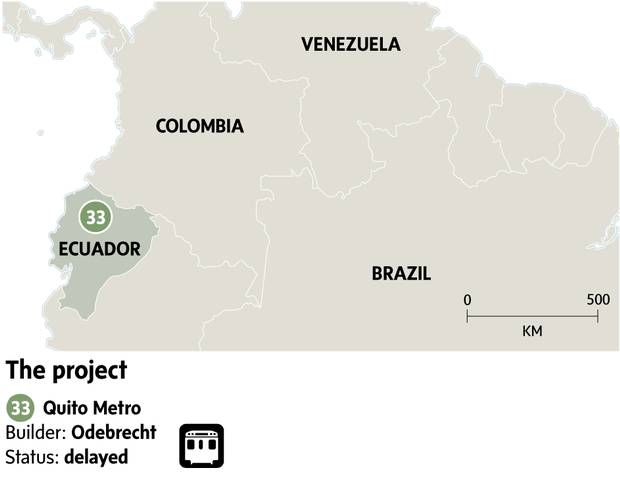
Peru
Former president Alejandro Toledo is a fugitive, with a warrant out for his arrest on graft charges, and two other former presidents have been ordered to testify at a corruption inquiry. The country has frozen $132-million in Odebrecht’s Peruvian accounts until the investigations are concluded.
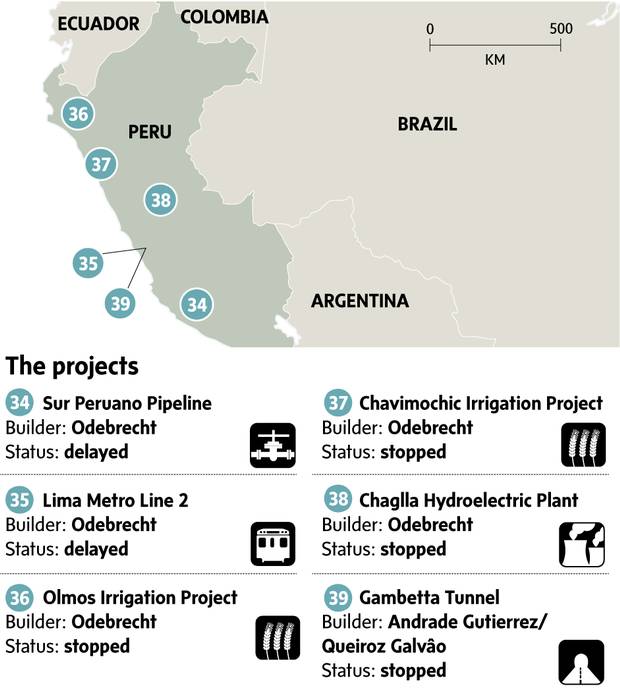
Argentina
Odebrecht has admitted to paying $35-million (U.S.) in bribes for contracts during the presidency of Cristina Fernandez de Kirchner, who already faces corruption charges in a similar but unrelated case; together these cases threaten the political future of the still-popular former leader. The country’s intelligence chief, a confidant of the current President, is also under investigation.
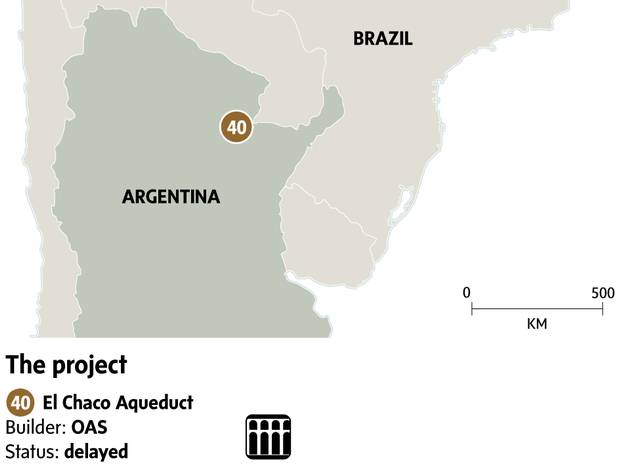
Brazil
The economic impact of Lava Jato on Brazil, where hundreds of construction projects have been affected, is estimated to be more than $60-billion and a 2.5-per-cent reduction in GDP. President Michel Temer faces criminal corruption charges and is fighting to stay in office.

Panama
Former president Ricardo Martinelli has been indicted in relation to the bribery scheme. Odebrecht has admitted to paying $59-million in bribes in Panama.
With reports from Elisangela Mendonca
THE GLOBE IN LATIN AMERICA: MORE FROM STEPHANIE NOLEN


